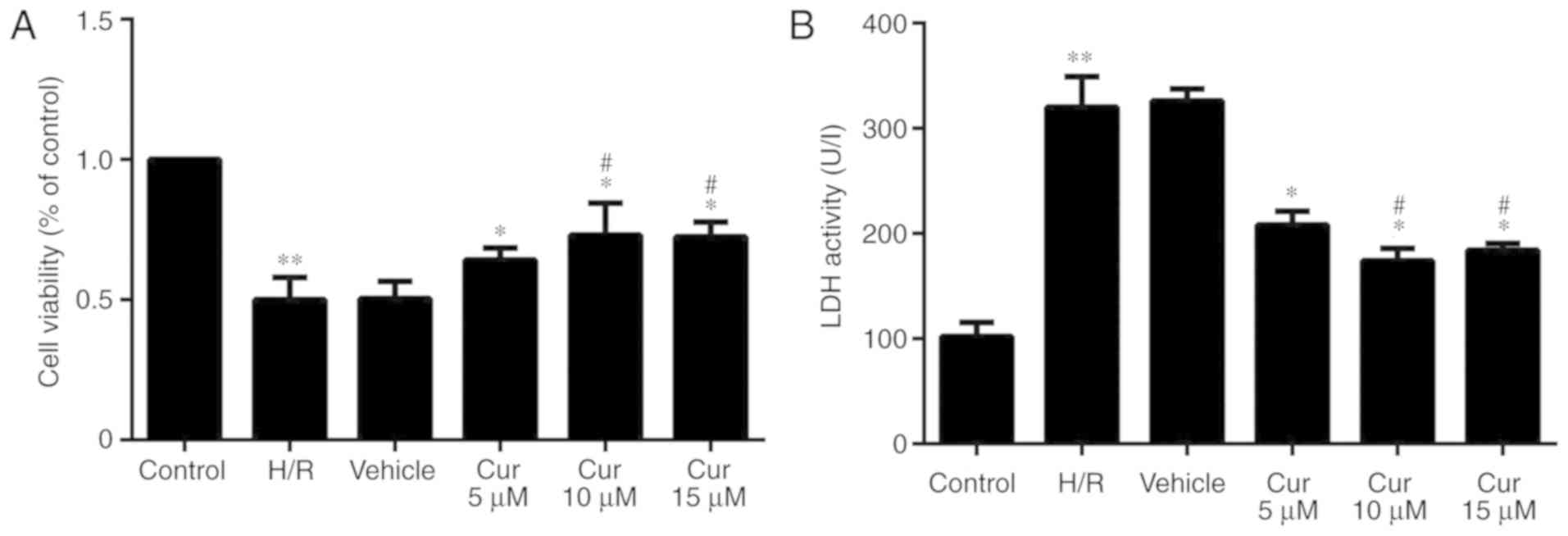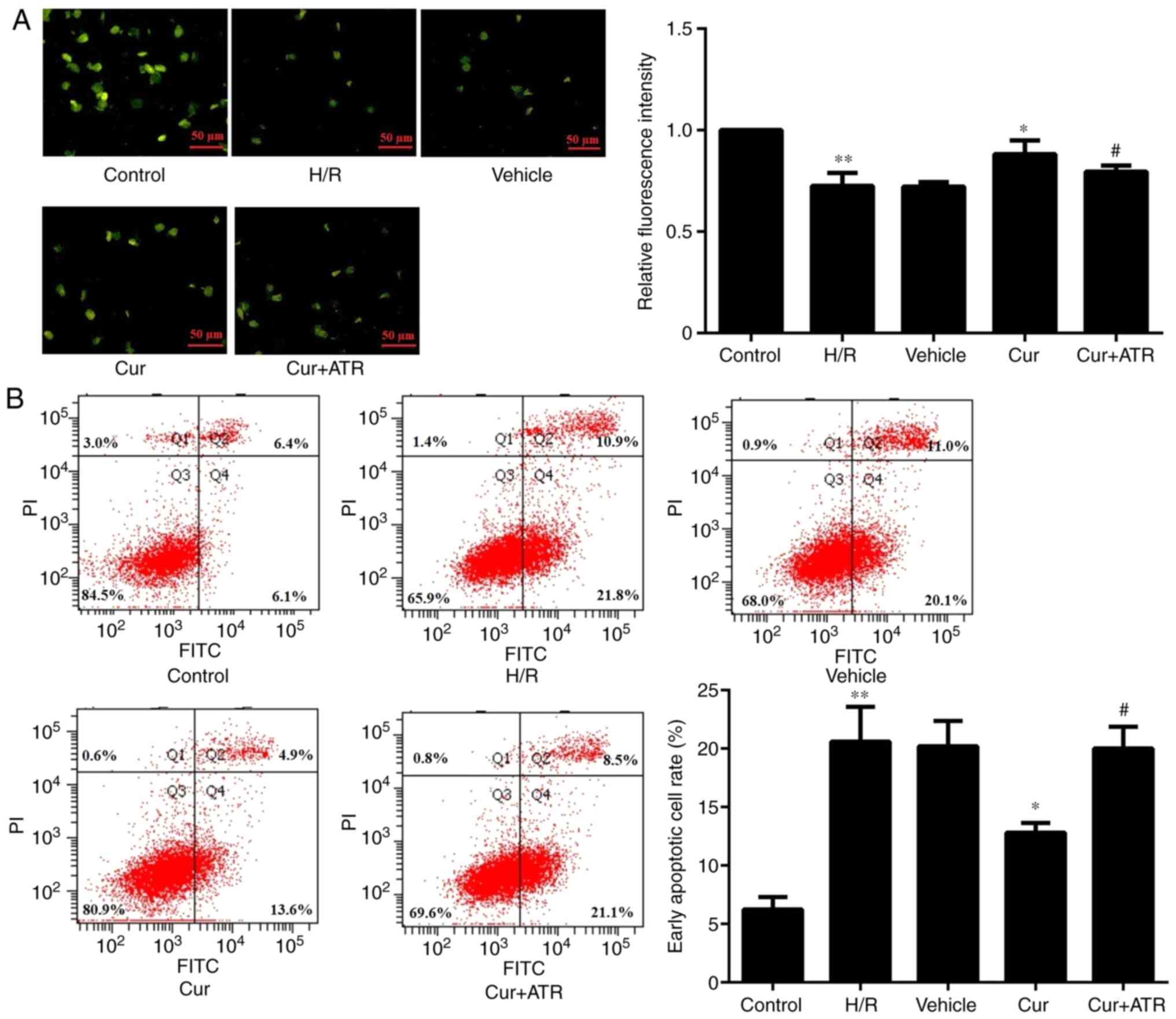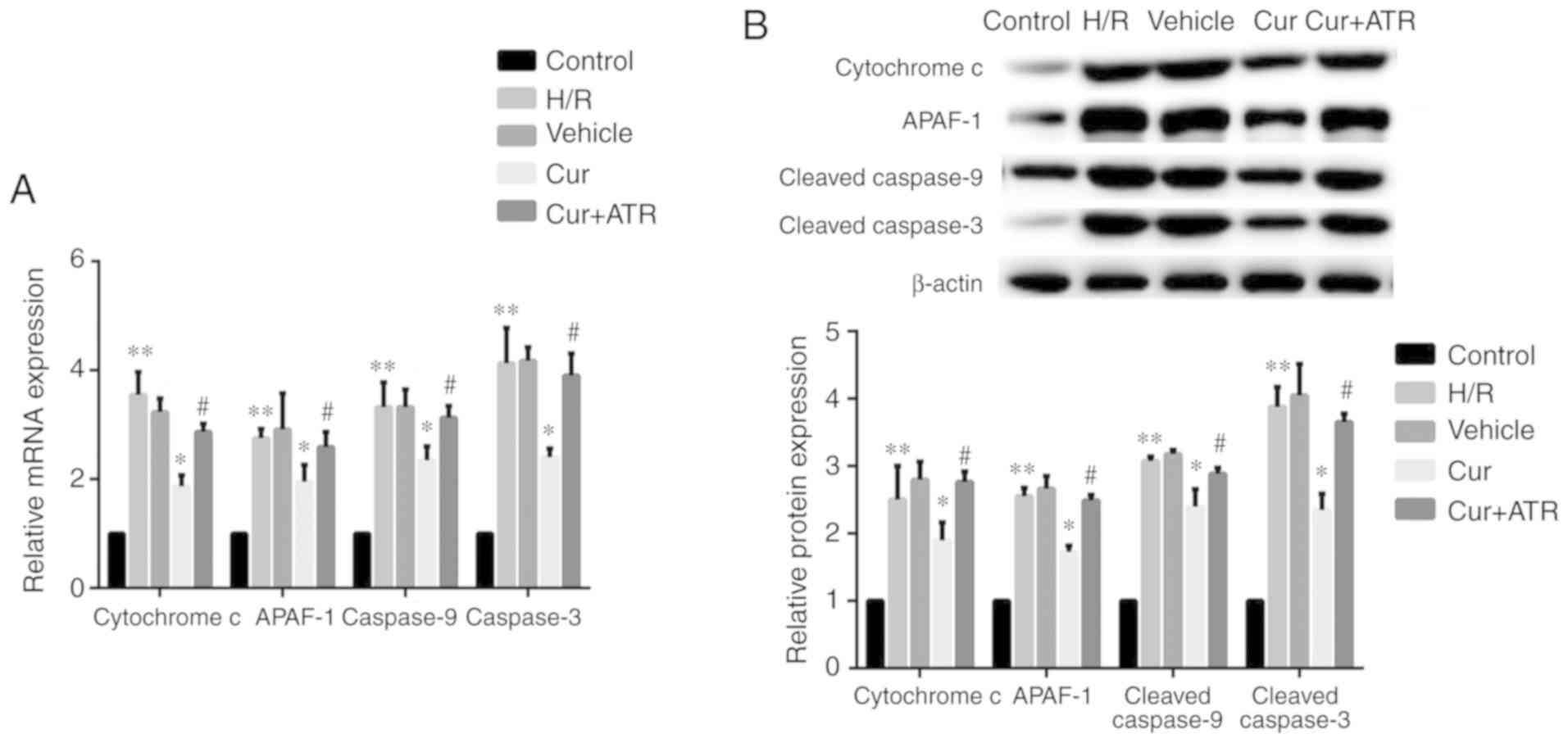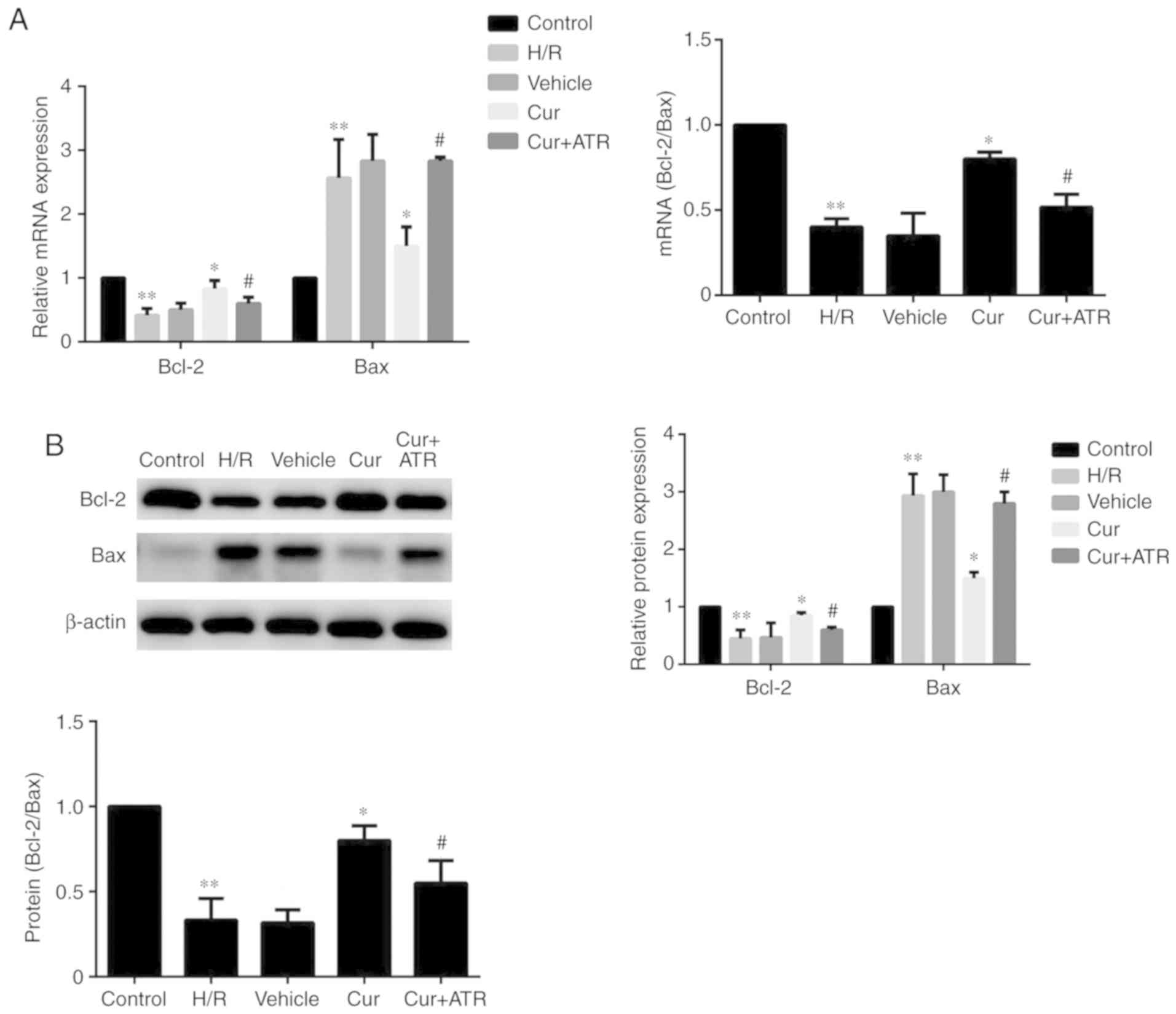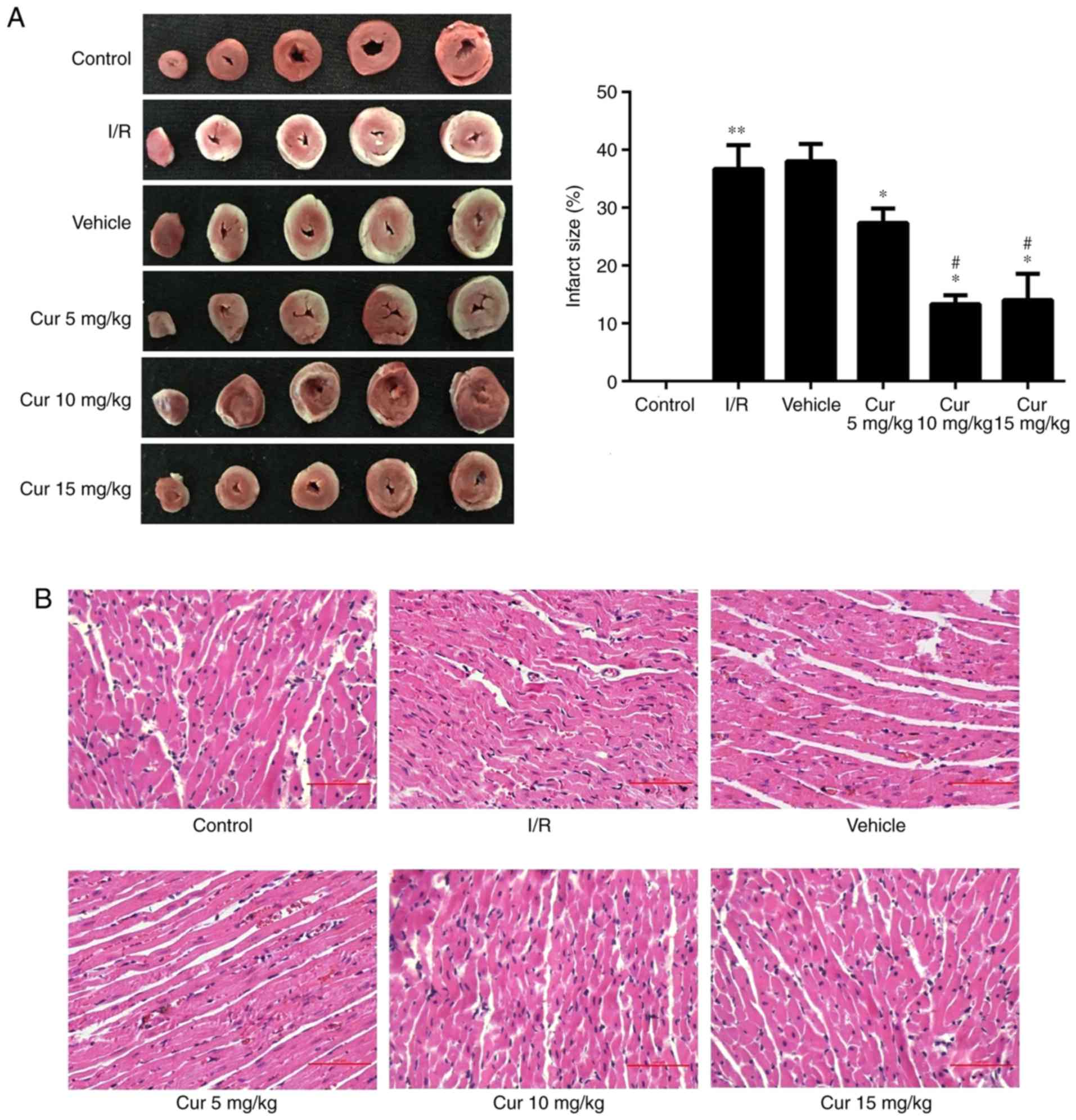|
1
|
Writing Group Members. Mozaffarian D,
Benjamin EJ, Go AS, Arnett DK, Blaha MJ, Cushman M, Das SR, de
Ferranti S, Després JP, et al: Executive summary: Heart disease and
stroke statistics-2016 update: A report from the American heart
association. Circulation. 133:447–454. 2016. View Article : Google Scholar : PubMed/NCBI
|
|
2
|
Turer AT and Hill JA: Pathogenesis of
myocardial ischemia-reperfusion injury and rationale for therapy.
Am J Cardiol. 106:360–368. 2010. View Article : Google Scholar : PubMed/NCBI
|
|
3
|
Kalogeris T, Baines CP, Krenz M and
Korthuis RJ: Cell biology of ischemia/reperfusion injury. Int Rev
Cell Mol Biol. 298:229–317. 2012. View Article : Google Scholar : PubMed/NCBI
|
|
4
|
Fraccarollo D, Galuppo P and Bauersachs J:
Novel therapeutic approaches to post-infarction remodelling.
Cardiovasc Res. 94:293–303. 2012. View Article : Google Scholar : PubMed/NCBI
|
|
5
|
Morciano G, Bonora M, Campo G, Aquila G,
Rizzo P, Giorgi C, Wieckowski MR and Pinton P: Mechanistic role of
mPTP in ischemia-reperfusion injury. Adv Exp Med Biol. 982:169–189.
2017. View Article : Google Scholar : PubMed/NCBI
|
|
6
|
Sanada S, Komuro I and Kitakaze M:
Pathophysiology of myocardial reperfusion injury: Preconditioning,
postconditioning, and translational aspects of protective measures.
Am J Physiol Heart Circ Physiol. 301:H1723–H1741. 2011. View Article : Google Scholar : PubMed/NCBI
|
|
7
|
Verma S, Fedak PW, Weisel RD, Butany J,
Rao V, Maitland A, Li RK, Dhillon B and Yau TM: Fundamentals of
reperfusion injury for the clinical cardiologist. Circulation.
105:2332–2336. 2002. View Article : Google Scholar : PubMed/NCBI
|
|
8
|
Nazari A, Sadr SS, Faghihi M, Azizi Y,
Hosseini MJ, Mobarra N, Tavakoli A and Imani A: Vasopressin
attenuates ischemia-reperfusion injury via reduction of oxidative
stress and inhibition of mitochondrial permeability transition pore
opening in rat hearts. Eur J Pharmacol. 760:96–102. 2015.
View Article : Google Scholar : PubMed/NCBI
|
|
9
|
Murphy E and Steenbergen C: Mechanisms
underlying acute protection from cardiac ischemia-reperfusion
injury. Physiol Rev. 88:581–609. 2008. View Article : Google Scholar : PubMed/NCBI
|
|
10
|
Bernardi P and Di Lisa F: The
mitochondrial permeability transition pore: Molecular nature and
role as a target in cardioprotection. J Mol Cell Cardiol.
78:100–106. 2015. View Article : Google Scholar :
|
|
11
|
Shires SE and Gustafsson ÅB: Mitophagy and
heart failure. J Mol Med (Berl). 93:253–262. 2015. View Article : Google Scholar
|
|
12
|
Piot C, Croisille P, Staat P, Thibault H,
Rioufol G, Mewton N, Elbelghiti R, Cung TT, Bonnefoy E, Angoulvant
D, et al: Effect of cyclosporine on reperfusion injury in acute
myocardial infarction. N Engl J Med. 359:473–481. 2008. View Article : Google Scholar : PubMed/NCBI
|
|
13
|
Morin D, Pires F, Plin C and Tillement JP:
Role of the permeability transition pore in cytochrome C release
from mitochondria during ischemia-reperfusion in rat liver. Biochem
Pharmacol. 68:2065–2073. 2004. View Article : Google Scholar : PubMed/NCBI
|
|
14
|
Winkler HH, Bygrave FL and Lehninger AL:
Characterization of the atractyloside-sensitive adenine nucleotide
transport system in rat liver mitochondria. J Biol Chem. 243:20–28.
1968.PubMed/NCBI
|
|
15
|
Murali VP and Kuttan G: Curculigoside
augments cell-mediated immune responses in metastatic tumor-bearing
animals. Immunopharmacol Immunotoxicol. 38:264–269. 2016.
View Article : Google Scholar : PubMed/NCBI
|
|
16
|
Kubo M, Namba K, Nagamoto N, Nagao T,
Nakanishi J, Uno H and Nishimura H: A new phenolic glucoside,
curculigoside from rhizomes of Curculigo orchioides. Planta Med.
47:52–55. 1983. View Article : Google Scholar : PubMed/NCBI
|
|
17
|
Zhu FB, Wang JY, Zhang YL, Quan RF, Yue
ZS, Zeng LR, Zheng WJ, Hou Q, Yan SG and Hu YG: Curculigoside
regulates proliferation, differentiation, and pro-inflammatory
cytokines levels in dexamethasone-induced rat calvarial
osteoblasts. Int J Clin Exp Med. 8:12337–12346. 2015.PubMed/NCBI
|
|
18
|
Wang YK, Hong YJ, Wei M, Wu Y, Huang ZQ,
Chen RZ and Chen HZ: Curculigoside attenuates human umbilical vein
endothelial cell injury induced by H2O2. J Ethnopharmacol.
132:233–239. 2010. View Article : Google Scholar : PubMed/NCBI
|
|
19
|
Zhu H, He J, Ye L, Lin F, Hou J, Zhong Y
and Jiang W: Mechanisms of angiogenesis in a curculigoside
A-treated rat model of cerebral ischemia and reperfusion injury.
Toxicol Appl Pharmacol. 288:313–321. 2015. View Article : Google Scholar : PubMed/NCBI
|
|
20
|
Jiang W, Fu F, Tian J, Zhu H and Hou J:
Curculigoside A attenuates experimental cerebral ischemia injury in
vitro and vivo. Neuroscience. 192:572–579. 2011. View Article : Google Scholar : PubMed/NCBI
|
|
21
|
Kang Z, Zhu H, Luan H, Han F and Jiang W:
Curculigoside A induces angiogenesis through VCAM-1/Egr-3/CREB/VEGF
signaling pathway. Neuroscience. 267:232–240. 2014. View Article : Google Scholar : PubMed/NCBI
|
|
22
|
Zhu H, Ding Y, Xu X, Li M, Fang Y, Gao B,
Mao H, Tong G, Zhou L and Huang J: Prostaglandin E1 protects
coronary microvascular function via the glycogen synthase kinase
3β-mitochondrial permeability transition pore pathway in rat hearts
subjected to sodium laurate-induced coronary microembolization. Am
J Transl Res. 9:2520–2534. 2017.
|
|
23
|
Kastenmayer RJ, Moore RM, Bright AL,
Torres-Cruz R and Elkins WR: Select agent and toxin regulations:
Beyond the eighth edition of the guide for the care and use of
laboratory animals. J Am Assoc Lab Anim Sci. 51:333–338.
2012.PubMed/NCBI
|
|
24
|
Wu N, Li W, Shu W and Jia D: Protective
effect of picroside II on myocardial ischemia reperfusion injury in
rats. Drug Des Devel Ther. 8:545–554. 2014.PubMed/NCBI
|
|
25
|
Herr DJ, Aune SE and Menick DR: Induction
and assessment of ischemia-reperfusion injury in
langendorff-perfused rat hearts. J Vis Exp. 27:e529082015.
|
|
26
|
Livak KJ and Schmittgen TD: Analysis of
relative gene expression data using real-time quantitative PCR and
the 2(−Delta Delta C(T)) method. Methods. 25:402–408. 2001.
View Article : Google Scholar
|
|
27
|
Chinese Pharmacopoeia Commission.
Pharmacopoeia of the People Republic of China. Chin Med Sci Technol
Press; Beijing: pp. 189–191. 2015
|
|
28
|
Miao M, Tian S, Guo L, Bai M, Fang X and
Liu S: The effect of curculigoside on mouse model of perimenopausal
depression. Saudi J Biol Sci. 24:1894–1902. 2017. View Article : Google Scholar
|
|
29
|
Hejazi II, Khanam R, Mehdi SH, Bhat AR,
Rizvi MMA, Thakur SC and Athar F: Antioxidative and
anti-proliferative potential of Curculigo orchioides Gaertn in
oxidative stress induced cytotoxicity: In vitro, ex vivo and in
silico studies. Food Chem Toxicol. 115:244–259. 2018. View Article : Google Scholar : PubMed/NCBI
|
|
30
|
Tian Z, Yu W, Liu HB, Zhang N, Li XB, Zhao
MG and Liu SB: Neuroprotective effects of curculigoside against
NMDA-induced neuronal excitoxicity in vitro. Food Chem Toxicol.
50:4010–4015. 2012. View Article : Google Scholar : PubMed/NCBI
|
|
31
|
Wang Y, Zhao L, Wang Y, Xu J, Nie Y, Guo
Y, Tong Y, Qin L and Zhang Q: Curculigoside isolated from Curculigo
orchioides prevents hydrogen peroxide-induced dysfunction and
oxidative damage in calvarial osteoblasts. Acta Biochim Biophys Sin
(Shanghai). 44:431–441. 2012. View Article : Google Scholar
|
|
32
|
Changa HT, Jan CR and Liang WZ: Protective
effects of a phenolic glycoside compound curculigoside on
h2o2-induced oxidative stress and
cytotoxicity in normal human breast epithelial cells. J Funct Food.
41:171–182. 2018. View Article : Google Scholar
|
|
33
|
Yang HX, Wang P, Wang NN, Li SD and Yang
MH: Tongxinluo ameliorates myocardial ischemia-reperfusion injury
mainly via activating parkin-mediated mitophagy and downregulating
ubiquitin-proteasome system. Chin J Integr Med. Jun 21–2019.(Epub
ahead of print). View Article : Google Scholar
|
|
34
|
Li Y, Xiang Y, Zhang S, Wang Y, Yang J,
Liu W and Xue F: Intramyocardial injection of thioredoxin
2-expressing lentivirus alleviates myocardial ischemia-reperfusion
injury in rats. Am J Transl Res. 9:4428–4439. 2017.PubMed/NCBI
|
|
35
|
Karch J and Molkentin JD: Identifying the
components of the elusive mitochondrial permeability transition
pore. Proc Natl Acad Sci USA. 111:10396–10397. 2014. View Article : Google Scholar : PubMed/NCBI
|
|
36
|
Baines CP, Song CX, Zheng YT, Wang GW,
Zhang J, Wang OL, Guo Y, Bolli R, Cardwell EM and Ping P: Protein
kinase cepsilon interacts with and inhibits the permeability
transition pore in cardiac mitochondria. Circ Res. 92:873–880.
2003. View Article : Google Scholar : PubMed/NCBI
|
|
37
|
Xu Z, Alloush J, Beck E and Weisleder N: A
murine model of myocardial ischemia-reperfusion injury through
ligation of the left anterior descending artery. J Vis Exp.
86:513292014.
|
|
38
|
Kim JS, Wang JH and Lemasters JJ:
Mitochondrial permeability transition in rat hepatocytes after
anoxia/reoxygenation: Role of Ca2+-dependent
mitochondrial formation of reactive oxygen species. Am J Physiol
Gastrointest Liver Physiol. 302:G723–G731. 2012. View Article : Google Scholar : PubMed/NCBI
|
|
39
|
Scarffe LA, Stevens DA, Dawson VL and
Dawson TM: Parkin and pink1: Much more than mitophagy. Trends
Neurosci. 37:315–324. 2014. View Article : Google Scholar : PubMed/NCBI
|
|
40
|
Skulachev VP: Bioenergetic aspects of
apoptosis, necrosis and mitoptosis. Apoptosis. 11:473–485. 2006.
View Article : Google Scholar : PubMed/NCBI
|
|
41
|
Kim R, Emi M, Tanabe K, Murakami S, Uchida
Y and Arihiro K: Regulation and interplay of apoptotic and
non-apoptotic cell death. J Pathol. 208:319–326. 2006. View Article : Google Scholar
|
|
42
|
Low IC, Kang J and Pervaiz S: Bcl-2: A
prime regulator of mitochondrial redox metabolism in cancer cells.
Antioxid Redox Signal. 15:2975–2987. 2011. View Article : Google Scholar : PubMed/NCBI
|
|
43
|
Takahashi A, Masuda A, Sun M, Centonze VE
and Herman B: Oxidative stress-induced apoptosis is associated with
alterations in mitochondrial caspase activity and Bcl-2-dependent
alterations in mitochondrial pH (pHm). Brain Res Bull. 62:497–504.
2004. View Article : Google Scholar : PubMed/NCBI
|
|
44
|
Martel C, Wang Z and Brenner C: Vdac
phosphorylation, a lipid sensor influencing the cell fate.
Mitochondrion. 19:69–77. 2014. View Article : Google Scholar : PubMed/NCBI
|
|
45
|
Green DR and Evan GI: A matter of life and
death. Cancer Cell. 1:19–30. 2002. View Article : Google Scholar : PubMed/NCBI
|
|
46
|
Burguillos MA, Hajji N, Englund E, Persson
A, Cenci AM, Machado A, Cano J, Joseph B and Venero JL:
Apoptosis-inducing factor mediates dopaminergic cell death in
response to LPS-induced inflammatory stimulus: Evidence in
Parkinson’s disease patients. Neurobiol Dis. 41:177–188. 2011.
View Article : Google Scholar
|















